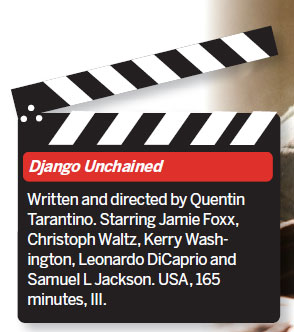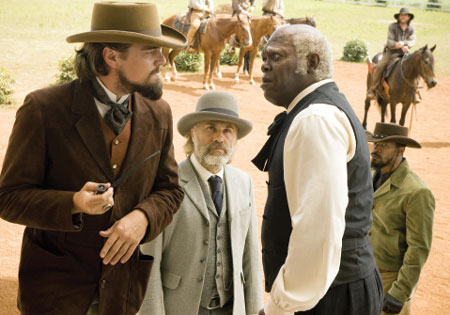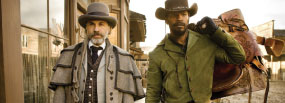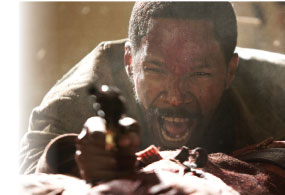Audacity 101
Updated: 2013-01-19 08:00
By Elizabeth Kerr(HK Edition)
|
|||||||
|
Plantation owner Calvin Candie (Leonardo DiCaprio) confers with his, ahem, secretary, Stephen (Samuel L Jackson) about his house guests |
|
Bounty hunting defiant ones King Schultz (Oscar nominee Christoph Waltz) and Django roll into another hostile town en route to a Candieland showdown in Django Unchained |
|
Django returns to Candieland for final retribution and a Tarantino-esque shootout. And it's every bit as gruesome as you'd expect |

Quentin Tarantino courts controversy in the gleefully retro Civil War spaghetti western. Elizabeth Kerr reports.
Slavery remains the great unspoken in American cinema. For all the space the issue occupies in the American social, political and collective consciousness, it is the one aspect of the nation's history that is repeatedly given short shrift in media, and if it is addressed, is done so with Spielbergian obtuseness. For a subject that weighs so heavily on the country (as if it were the only one to practice slave traditions at some point) and plays such a huge role in its identity, you'd think there would be considerable discourse about it. That's far from the case, and so it's not surprising that a willfully confrontational filmmaker like Quentin Tarantino - perceived as existing outside the Hollywood establishment while being very much a part of it now - would be the one to try. Regardless of which side of the divide you fall on, he is a director that gets you talking, and if his revisionist WWII epic Inglourious Basterds didn't Django Unchained should.
On a wooded Texas road in the middle of the night just before the Civil War, Dr King Schultz (Oscar nominee Christoph Waltz) dispatches two slave traders that have a man Schultz needs. Schultz is disguised as a dentist but in reality is a bounty hunter, and he needs Django's (Jamie Foxx) help identifying three outlaw brothers. He does, and then accepts Schultz's offer of partnership, splitting the money as a free man. Because like the film, Schultz simply wants to make this slavery malarkey work for him. After a lucrative winter hunt, Schultz and Django head to Mississippi to begin the search for Django's missing wife, Broomhilda (Kerry Washington), now in the hands of the sadistic Calvin Candie (Leonardo DiCaprio). Let the mayhem begin.
By wrapping slavery around a pulpy revenge western (maybe the other way around) the fear is of Tarantino debasing the issue. He doesn't. As the master copycat he is (this time an homage to the Italian oater Django), Tarantino has constructed a pitch perfect spaghetti western complete with bombastic title song and sudden hyper-zooms. Tarantino is respectful of his subject matter - the only violence in the film that feels truly horrifying is that involving slavery - but he's not afraid to allow his film to unfold the way it's supposed to. All the QT ticks are here too, like the rambling conversations over semantics (the early KKK debating hoods is hilarious), the blistering eruptions of violence and juxtaposition of contrasting images. When Django unleashes his fury on a former master using a whip, you can see the thirst for vengeance oozing from him, but he does wearing the first outfit he's ever chosen for himself - a ridiculous bright blue suit fit for a British dandy. Django Unchained has some of the only depiction of the brutality of slavery on screen in years, maybe decades and they have the gravitas they deserve.
Along those lines, the most interesting aspect of Django rests in Stephen's (Samuel L Jackson) hands, Candie's house "manager," the slave who rules other slaves. Jackson is glorious as the sycophant that has internalized so much of Candie's draconian thinking he believes it. The issue of slave-on-slave violence or collaboration is the touchiest of angles, and Jackson turns in a fearless performance, making Stephen more than just a traitor. He's ultimately the villain and a factor in the bloody finale, and this is where Tarantino drops the ball he's so precariously been juggling. As Django, Foxx to that point was tightly coiled and suspicious - stoic yet quick to strike out when rage reached critical mass. It is one of Foxx's best performances ever, but the last minutes take a bizarrely comical turn that almost, almost, crushes everything that came before. That tonal shift is jarring, and Broomhilda could have been more engaging, but an amazing tapestry of cameos and the audacity to make the film in the first place make Django Unchained one of the best films of 2012.
Django Unchained opened in Hong Kong on Thursday.
(HK Edition 01/19/2013 page4)


